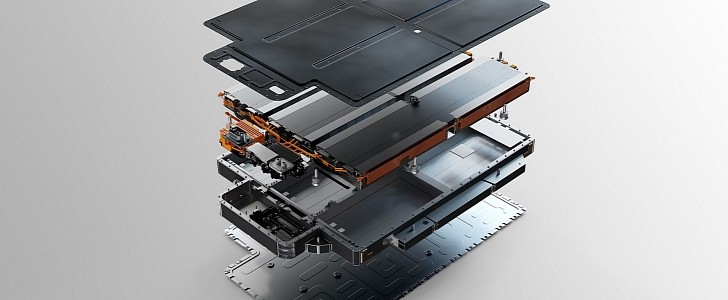NIO started its career with 70-kWh and 85-kWh swappable battery packs. As time went by, the 85-kWh battery pack was replaced by a 100-kWh unit. Rumors about a new battery pack to replace the 70-kWh component said it would come with LFP (lithium iron phosphate) cells. Still, nothing prepared us for what NIO would actually present: a 75-kWh hybrid battery pack that mixes ternary and LFP cells.
According to NIO, the new battery pack puts the best of both worlds together in a single unit. The LFP cells allow a CTP (cell-to-pack) construction, increasing energy density and possibly working as a structural component. In NIO’s new battery pack, that does not seem to be the case: the pictures reveal six battery modules inserted in a metal structure (possibly aluminum).
NIO’s CTP seems to focus solely on an energy density improvement. The company stated that it achieved a 14% increase, making its LFP cells present 142 Wh/kg. Volume utilization was also increased by 5%, and manufacturing was simplified by 10%.
The ternary batteries (NMC or NCA, NIO did not disclose which chemistry) improve the cold-weather performance and make the battery pack more accurate in determining the units' SoC (state of charge).
NIO says that mixing the two kinds of cells in the hybrid battery pack reduced range loss in low temperatures by 25% compared to a unit that worked solely with LFP cells. The mix itself is not the secret sauce but rather how NIO did it.
The company developed a dual chemistry control algorithm that regulates both groups of cells so that the advantage of ternary batteries in cold weather improves the low-temperature energy efficiency of LFP cells. The company did not reveal how the batteries are arranged, but it seems that engineers chose to intercalate bricks of each of these cells.
The environment shielder prevents heat loss with low-thermal conductivity materials and “innovative structural design.” NIO’s thermal management tries to use the heat the batteries naturally generate to keep the system at the ideal temperature without spending much energy. Parasitic losses can compromise range in multiple EVs.
If the idea proves to be successful, NIO will have a unique battery pack that can still be swapped in 3 to 6 minutes. It will also cost less than ternary battery packs, but the Chinese automaker made a very clever move here. Cars with the 75-kWh battery pack cost as much as those that used to have the 70-kWh ternary battery pack. That said, and although it is cheaper, the extra energy can help explain why these vehicles are not more affordable.
Starting this September 23, customers can order NIO vehicles either with the new 75-kWh hybrid battery pack or with the 100-kWh ternary component. The prices for BaaS with the 75-kWh battery pack will remain the same: RMB980 ($152 at the current exchange rate) per month. The manufacturer did not provide any date on the range the new solution will offer to its vehicles, but it certainly is a little higher than before.
NIO’s CTP seems to focus solely on an energy density improvement. The company stated that it achieved a 14% increase, making its LFP cells present 142 Wh/kg. Volume utilization was also increased by 5%, and manufacturing was simplified by 10%.
The ternary batteries (NMC or NCA, NIO did not disclose which chemistry) improve the cold-weather performance and make the battery pack more accurate in determining the units' SoC (state of charge).
NIO says that mixing the two kinds of cells in the hybrid battery pack reduced range loss in low temperatures by 25% compared to a unit that worked solely with LFP cells. The mix itself is not the secret sauce but rather how NIO did it.
The company developed a dual chemistry control algorithm that regulates both groups of cells so that the advantage of ternary batteries in cold weather improves the low-temperature energy efficiency of LFP cells. The company did not reveal how the batteries are arranged, but it seems that engineers chose to intercalate bricks of each of these cells.
The environment shielder prevents heat loss with low-thermal conductivity materials and “innovative structural design.” NIO’s thermal management tries to use the heat the batteries naturally generate to keep the system at the ideal temperature without spending much energy. Parasitic losses can compromise range in multiple EVs.
If the idea proves to be successful, NIO will have a unique battery pack that can still be swapped in 3 to 6 minutes. It will also cost less than ternary battery packs, but the Chinese automaker made a very clever move here. Cars with the 75-kWh battery pack cost as much as those that used to have the 70-kWh ternary battery pack. That said, and although it is cheaper, the extra energy can help explain why these vehicles are not more affordable.
Starting this September 23, customers can order NIO vehicles either with the new 75-kWh hybrid battery pack or with the 100-kWh ternary component. The prices for BaaS with the 75-kWh battery pack will remain the same: RMB980 ($152 at the current exchange rate) per month. The manufacturer did not provide any date on the range the new solution will offer to its vehicles, but it certainly is a little higher than before.











